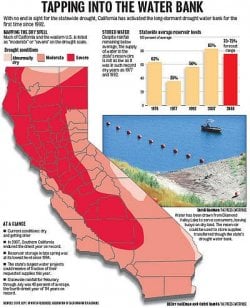Trajan
conscientia mille testes
I thought this was taken care of when the local congressman was bribed with more water for his vote for Obama care?
Nancy, where are you?
Fresno, Zimbabwe
Posted 12/28/2010 06:43 PM ET
Environmentalism: Fresno, Calif., stands as the de facto capital of California's mighty Central Valley, the breadbasket of America. So why is that city preoccupied with winning a $1 million prize to stave off hunger?
Local newspapers and Fresno County officials are trying to rally Facebook users to vote for Fresno in a corporate contest sponsored by Wal-Mart for $1 million in charity food donations for the hungry. Fresno, a city of 505,000, has taken the national lead because 24.1% of Fresno's families are going hungry.
Civic spirit is good, but something big is wrong here. Fresno is the agricultural capital of America. More food per acre in more variety can be grown in the fertile Central Valley surrounding this community than on any other land in America perhaps in the world.
Yet far from being a paradise, Fresno is starting to resemble Zimbabwe or 1930s Ukraine, a victim of a famine machine that is entirely man-made, not by red communists this time, but by greens.
State and federal officials, driven by the agenda of environmental extremists, have made it extremely difficult for the valley's farms, introducing costly environmental regulations and cutting off critical water supplies to save the Delta smelt, a bait fish. It's all driving the economy to collapse.
In the southwest part of the Central Valley, water allotments as low as 10% of normal have created a visible dust bowl. The knock-on effect can be seen in cities like Fresno, where November's unemployment among the packers, cannery workers and professional fields that make agriculture productive stands at 16.9%.
Other Central Valley cities such as Hanford-Corcoran, Merced, Modesto, Stockton and Visalia-Porterville have similar jobless numbers, the highest in the country. The Wal-Mart Foundation notes that "24.1% of families in this community (Fresno) cannot afford regular meals compared to a national average of 9.2%."
more at-
Fresno, Zimbabwe - Investors.com
Nancy, where are you?
Fresno, Zimbabwe
Posted 12/28/2010 06:43 PM ET
Environmentalism: Fresno, Calif., stands as the de facto capital of California's mighty Central Valley, the breadbasket of America. So why is that city preoccupied with winning a $1 million prize to stave off hunger?
Local newspapers and Fresno County officials are trying to rally Facebook users to vote for Fresno in a corporate contest sponsored by Wal-Mart for $1 million in charity food donations for the hungry. Fresno, a city of 505,000, has taken the national lead because 24.1% of Fresno's families are going hungry.
Civic spirit is good, but something big is wrong here. Fresno is the agricultural capital of America. More food per acre in more variety can be grown in the fertile Central Valley surrounding this community than on any other land in America perhaps in the world.
Yet far from being a paradise, Fresno is starting to resemble Zimbabwe or 1930s Ukraine, a victim of a famine machine that is entirely man-made, not by red communists this time, but by greens.
State and federal officials, driven by the agenda of environmental extremists, have made it extremely difficult for the valley's farms, introducing costly environmental regulations and cutting off critical water supplies to save the Delta smelt, a bait fish. It's all driving the economy to collapse.
In the southwest part of the Central Valley, water allotments as low as 10% of normal have created a visible dust bowl. The knock-on effect can be seen in cities like Fresno, where November's unemployment among the packers, cannery workers and professional fields that make agriculture productive stands at 16.9%.
Other Central Valley cities such as Hanford-Corcoran, Merced, Modesto, Stockton and Visalia-Porterville have similar jobless numbers, the highest in the country. The Wal-Mart Foundation notes that "24.1% of families in this community (Fresno) cannot afford regular meals compared to a national average of 9.2%."
more at-
Fresno, Zimbabwe - Investors.com



